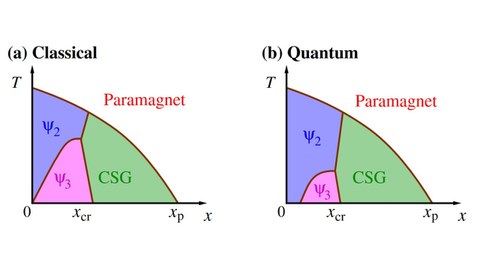Mar 28, 2018
Research: Cluster-glass phase in pyrochlore XY antiferromagnets with quenched disorder
Rare-earth pyrochlores form one of the most interesting families of frustrated magnets, with a plethora of novel states such as spin ices, quantum spin liquids, and order-by-disorder antiferromagnets. We have theoretically studied the impact of quenched disorder (random exchange couplings or site dilution) on a particular class of systems, namely easy-plane pyrochlore antiferromagnets. In the clean case, order-by-disorder selects a magnetically ordered state from a classically degenerate manifold. In the presence of randomness, however, different orders can be chosen locally depending on details of the disorder configuration. Using a combination of analytical considerations and classical Monte-Carlo simulations, we have shown that any long-range-ordered magnetic state is destroyed beyond a critical level of randomness where the system breaks into magnetic domains due to random exchange anisotropies, becoming, therefore, a glass of spin clusters, in accordance with the available experimental data. More broadly, we have established a general mechanism for glassiness in spin-orbit-coupled magnets where long-range order is destroyed via effective random anisotropies originating from off-diagonal exchange couplings.
E. C. Andrade, J. A. Hoyos, S. Rachel, M. Vojta,
Cluster-Glass Phase in Pyrochlore XY Antiferromagnets with Quenched Disorder,
Phys Rev. Lett. 120, 097204 (2018) (arXiv)

